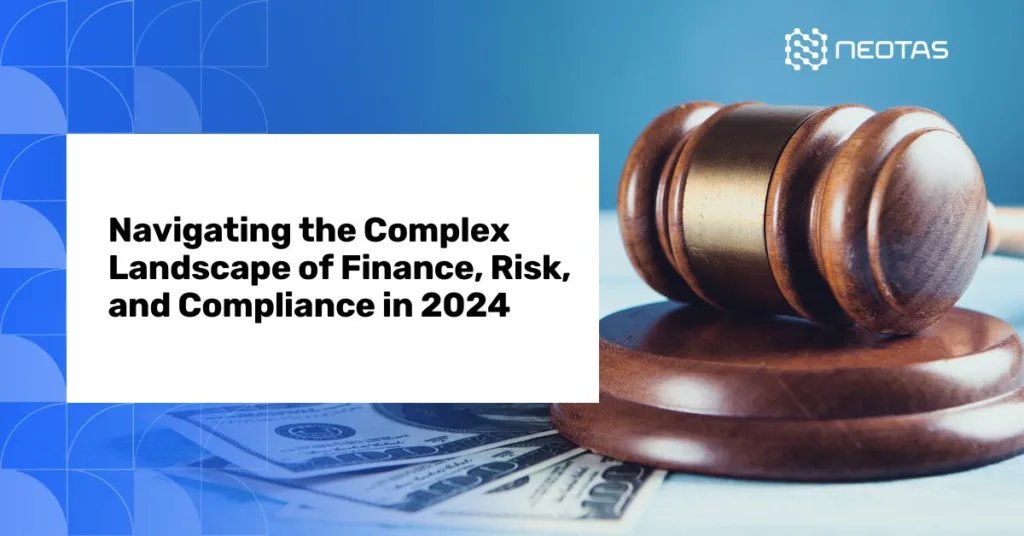

In an era marked by rapid regulatory changes and escalating financial crime, staying ahead in the finance, risk, and compliance sector is paramount. The “Neotas Finance, Risk, and Compliance Chronicle 2024” offers invaluable insights into the trends and challenges of the past year while charting a course for resilience and compliance in the year ahead.
The report provides a comprehensive analysis of the current landscape and future outlook for compliance teams, highlighting the persistent challenges and evolving dynamics within the anti-money laundering (AML) and sanctions compliance sectors.
Key Insights:
A notable trend observed in 2023 was the significant increase in Suspicious Activity Reports (SARs), suggesting heightened vigilance and reporting activity within regulated entities. The report also marks the Economic Crime and Corporate Transparency Act (ECCTA) as a pivotal development in enhancing the legal framework to combat financial crime, introducing major amendments to Companies House practices and establishing a new offence for the failure to prevent fraud.
Additionally, the report covers the amendments made to Money Laundering Regulations in 2023, aimed at bolstering the existing AML framework. It also touches upon the European Union’s efforts to harmonise AML rules across member states, which could lead to more consistent and effective AML practices across the bloc.
The report underscores the necessity for compliance teams to stay adaptable and informed in order to effectively navigate the ever-changing regulatory environment and mitigate the risks associated with financial crimes.
In the ever-changing landscape of finance, risk, and compliance, staying informed and proactive is key to navigating the challenges ahead. The “Neotas Finance, Risk, and Compliance Chronicle 2024” equips financial professionals with the knowledge and tools to enhance their compliance strategies, ensuring their firms remain resilient in the face of regulatory scrutiny and financial crime threats.
Empower your compliance strategy for 2024. Download the “Neotas Finance, Risk, and Compliance Chronicle 2024” today and leverage cutting-edge insights and equip your team with the knowledge to thrive in a challenging regulatory environment and navigate the complexities of the regulatory environment.
Neotas Platform covers 600Bn+ archived web pages, 1.8Bn+ court records, 198M+ corporate records, global social media platforms, and 40,000+ Media sources from over 100 countries to help you build a comprehensive picture of the team. It’s a world-first, searching beyond Google. Neotas’ diligence uncovers illicit activities, reducing financial and reputational risk.
Manage Financial Compliance and Business Risk with OSINT.
Neotas is an Enhanced Due Diligence Platform that leverages AI to join the dots between Corporate Records, Adverse Media and Open Source Intelligence (OSINT).
Schedule a Call or Book a Demo of Neotas Enhanced Due Diligence Platform.
Why is financial crime compliance important?
Financial crime compliance is critical in maintaining the integrity and trustworthiness of financial institutions. It entails adhering to regulations and implementing measures to prevent illicit activities like money laundering, terrorist financing, and fraud.
How do financial crime compliance solutions benefit organisations?
These solutions play a pivotal role in safeguarding organisations against financial crimes, protecting their reputation, and mitigating risks. By deploying robust compliance measures, businesses can demonstrate their commitment to ethical practices and regulatory compliance.
How does financial crime compliance impact the banking sector?
Financial crime compliance is particularly crucial for banks, as they are often targeted by criminals seeking to exploit vulnerabilities in the financial system. Compliance ensures that banks operate within legal boundaries, fostering trust among customers, investors, and regulators.
What factors contribute to the cost of financial crime compliance?
The cost of compliance encompasses various elements, including investments in technology, staff training, regulatory assessments, and compliance monitoring tools. Additionally, non-compliance can result in hefty fines, reputational damage, and legal repercussions, further escalating the overall cost.
What does FCC stand for in the context of financial crime compliance?
FCC stands for Financial Crime Compliance, a comprehensive approach aimed at preventing, detecting, and mitigating financial crimes within an organisation. It involves implementing robust policies, procedures, and controls to identify and address potential risks effectively.
What is financial crime compliance framework?
The financial crime compliance framework serves as a structured blueprint outlining the policies, procedures, and controls necessary to manage financial crime risks effectively. It provides a systematic approach for organisations to assess, monitor, and mitigate risks associated with money laundering, fraud, and other illicit activities.
How does financial crime compliance differ within the UK?
Financial crime compliance in the UK aligns with specific regulatory requirements, including the Proceeds of Crime Act, Money Laundering Regulations, and the Financial Conduct Authority’s (FCA) guidelines. Compliance efforts in the UK are tailored to local laws and regulatory expectations.
Why is global financial crimes compliance essential?
Global financial crimes compliance ensures consistency in compliance efforts across different jurisdictions, particularly for multinational organisations. By adhering to international standards and regulations, businesses can effectively manage risks and maintain compliance on a global scale.
What are the essential components of a financial crime compliance programme?
A comprehensive compliance programme typically includes components such as customer due diligence, transaction monitoring, sanctions screening, suspicious activity reporting, and ongoing training and awareness initiatives. These elements work in tandem to identify, prevent, and mitigate financial crime risks.
How can technology enhance financial crime compliance efforts?
Advanced technologies, such as artificial intelligence (AI) and machine learning, can significantly enhance financial crime compliance efforts by automating processes, detecting patterns, and identifying suspicious activities in real-time. By leveraging technology, organisations can improve the efficiency and effectiveness of their compliance programmes.
What role do regulators play in financial crime compliance?
Regulators play a vital role in setting and enforcing regulations related to financial crime compliance. They conduct audits, provide guidance, and impose sanctions on non-compliant entities to ensure adherence to regulatory standards and promote integrity within the financial sector.
How can organisations improve their financial crime compliance posture?
Organisations can enhance their compliance posture by implementing robust compliance systems, conducting regular risk assessments, fostering a culture of compliance, and staying abreast of regulatory developments. Additionally, proactive monitoring and continuous improvement are essential to maintaining compliance effectiveness.
What are some common challenges faced in financial crime compliance?
Challenges in financial crime compliance include navigating complex regulatory requirements, managing data privacy and security concerns, allocating sufficient resources for compliance efforts, and keeping pace with evolving financial crime trends and tactics. Overcoming these challenges requires a proactive and adaptive approach to compliance management.
How can organisations stay updated on financial crime compliance trends?
To stay abreast of financial crime compliance trends, organisations can participate in industry forums, attend training sessions and conferences, engage with regulatory bodies, and leverage professional networks. Additionally, subscribing to relevant publications and conducting regular assessments of regulatory updates can help organisations remain informed and responsive to emerging trends.
What are the potential consequences of failing to comply with financial crime regulations?
Non-compliance with financial crime regulations can have severe consequences, including reputational damage, financial penalties, legal sanctions, loss of customer trust, and regulatory scrutiny. In some cases, non-compliant individuals and organisations may face criminal prosecution, highlighting the importance of robust compliance measures in mitigating risks and safeguarding organisational integrity.
financial crime compliance
financial crimes compliance
what is financial crime compliance
financial crime and compliance
financial crime and compliance management
financial crime compliance jobs
financial crime compliance solutions
financial crimes compliance jobs
compliance and financial crime
cost of financial crime compliance
enterprise financial crimes compliance
fcc financial crime compliance
anti financial crime compliance
conduct financial crime and compliance
financial crime compliance analyst
financial crime compliance analyst salary
financial crime compliance certification
financial crime compliance course
financial crime compliance definition
financial crime compliance framework
financial crime compliance in banking
financial crime compliance meaning
financial crime compliance risk management
global financial crimes compliance
true cost of financial crime compliance global report
what is financial crimes compliance

Neotas Enhanced Due Diligence covers 600Bn+ Archived web pages, 1.8Bn+ court records, 198M+ Corporate records, Global Social Media platforms, and more than 40,000 Media sources from over 100 countries to help you screen & manage risks.
 Download Now
Download Now






















Neotas Platform covers 600Bn+ archived web pages, 1.8Bn+ court records, 198M+ corporate records, global social media platforms, and 40,000+ Media sources from over 100 countries to help you build a comprehensive picture of the team.
Neotas Platform covers 600Bn+ archived web pages, 1.8Bn+ court records, 198M+ corporate records, global social media platforms, and 40,000+ Media sources from over 100 countries to help you build a comprehensive picture of the team.
| Cookie | Duration | Description |
|---|---|---|
| AWSALBTG | 7 days | AWS Application Load Balancer Cookie. Load Balancing Cookie: Used to encode information about the selected target group. |
| AWSALBTGCORS | 7 days | AWS Classic Load Balancer Cookie: Used to map the session to the instance. This cookie is identical to the original ELB cookie except for the attribute &SameSite=None; |
| cookielawinfo-checkbox-advertisement | 1 year | Set by the GDPR Cookie Consent plugin, this cookie is used to record the user consent for the cookies in the "Advertisement" category . |
| cookielawinfo-checkbox-analytics | 11 months | This cookie is set by GDPR Cookie Consent plugin. The cookie is used to store the user consent for the cookies in the category "Analytics". |
| cookielawinfo-checkbox-functional | 11 months | The cookie is set by GDPR cookie consent to record the user consent for the cookies in the category "Functional". |
| cookielawinfo-checkbox-necessary | 11 months | This cookie is set by GDPR Cookie Consent plugin. The cookies is used to store the user consent for the cookies in the category "Necessary". |
| cookielawinfo-checkbox-others | 11 months | This cookie is set by GDPR Cookie Consent plugin. The cookie is used to store the user consent for the cookies in the category "Other. |
| cookielawinfo-checkbox-performance | 11 months | This cookie is set by GDPR Cookie Consent plugin. The cookie is used to store the user consent for the cookies in the category "Performance". |
| CookieLawInfoConsent | 1 year | Records the default button state of the corresponding category & the status of CCPA. It works only in coordination with the primary cookie. |
| debug | never | Cookie used to debug code and website issues |
| shown | session | Session cookie to control number of times a pop up is shown. |
| viewed_cookie_policy | 11 months | The cookie is set by the GDPR Cookie Consent plugin and is used to store whether or not user has consented to the use of cookies. It does not store any personal data. |
| Cookie | Duration | Description |
|---|---|---|
| __cf_bm | 30 minutes | This cookie, set by Cloudflare, is used to support Cloudflare Bot Management. |
| AnalyticsSyncHistory | 1 month | Used to store information about the time a sync took place with the lms_analytics cookie |
| bcookie | 2 years | LinkedIn sets this cookie from LinkedIn share buttons and ad tags to recognize browser ID. |
| bscookie | 2 years | LinkedIn sets this cookie to store performed actions on the website. |
| lang | session | LinkedIn sets this cookie to remember a user's language setting. |
| lidc | 1 day | LinkedIn sets the lidc cookie to facilitate data center selection. |
| UserMatchHistory | 1 month | LinkedIn sets this cookie for LinkedIn Ads ID syncing. |
| Cookie | Duration | Description |
|---|---|---|
| li_gc | 2 years | Used to store consent of guests regarding the use of cookies for non-essential purposes |
| rl_anonymous_id | 1 year | Generates an unique anonymous Id to identify a user and attach to a subsequent event. |
| rl_user_id | 1 year | to store a unique user ID for the purpose of Marketing/Tracking |
| Cookie | Duration | Description |
|---|---|---|
| _ga | 2 years | The _ga cookie, installed by Google Analytics, calculates visitor, session and campaign data and also keeps track of site usage for the site's analytics report. The cookie stores information anonymously and assigns a randomly generated number to recognize unique visitors. |
| _gat_gtag_UA_107495977_1 | 1 minute | Set by Google to distinguish users. |
| _gat_UA-107495977-1 | 1 minute | A variation of the _gat cookie set by Google Analytics and Google Tag Manager to allow website owners to track visitor behaviour and measure site performance. The pattern element in the name contains the unique identity number of the account or website it relates to. |
| _gcl_au | 3 months | Provided by Google Tag Manager to experiment advertisement efficiency of websites using their services. |
| _gid | 1 day | Installed by Google Analytics, _gid cookie stores information on how visitors use a website, while also creating an analytics report of the website's performance. Some of the data that are collected include the number of visitors, their source, and the pages they visit anonymously. |
| attribution_user_id | 1 year | This cookie is set by Typeform for usage statistics and is used in context with the website's pop-up questionnaires and messengering. |
| CONSENT | 2 years | YouTube sets this cookie via embedded youtube-videos and registers anonymous statistical data. |
| Cookie | Duration | Description |
|---|---|---|
| _fbp | 3 months | This cookie is set by Facebook to display advertisements when either on Facebook or on a digital platform powered by Facebook advertising, after visiting the website. |
| fr | 3 months | Facebook sets this cookie to show relevant advertisements to users by tracking user behaviour across the web, on sites that have Facebook pixel or Facebook social plugin. |
| IDE | 1 year 24 days | Google DoubleClick IDE cookies are used to store information about how the user uses the website to present them with relevant ads and according to the user profile. |
| test_cookie | 15 minutes | The test_cookie is set by doubleclick.net and is used to determine if the user's browser supports cookies. |
| VISITOR_INFO1_LIVE | 5 months 27 days | A cookie set by YouTube to measure bandwidth that determines whether the user gets the new or old player interface. |
| YSC | session | YSC cookie is set by Youtube and is used to track the views of embedded videos on Youtube pages. |
| yt-remote-connected-devices | never | YouTube sets this cookie to store the video preferences of the user using embedded YouTube video. |
| yt-remote-device-id | never | YouTube sets this cookie to store the video preferences of the user using embedded YouTube video. |
| yt.innertube::nextId | never | This cookie, set by YouTube, registers a unique ID to store data on what videos from YouTube the user has seen. |
| yt.innertube::requests | never | This cookie, set by YouTube, registers a unique ID to store data on what videos from YouTube the user has seen. |